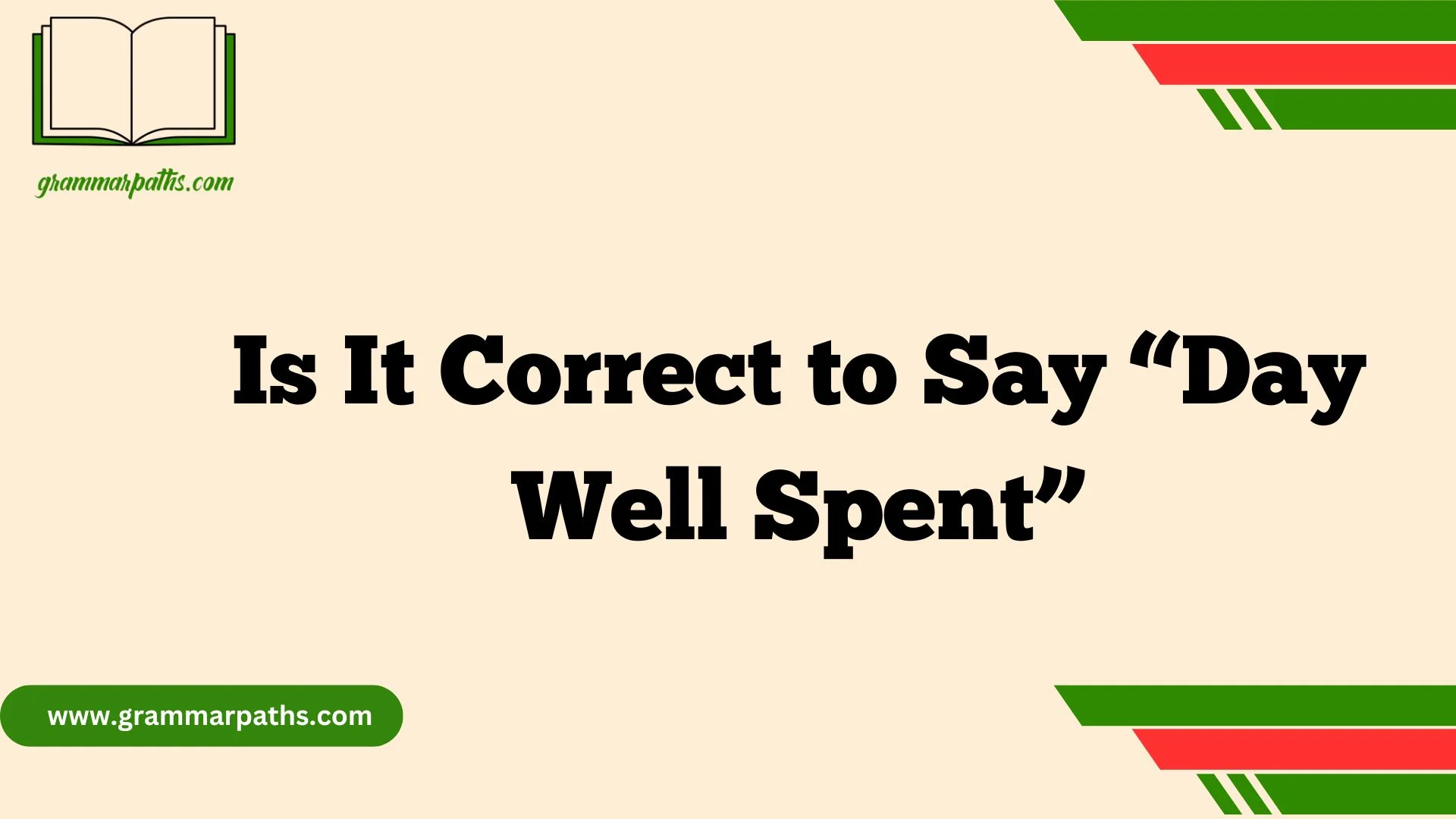Have you ever wrapped up a perfect afternoon and thought to yourself, “That was a day well spent”? The phrase has become increasingly popular on social media and in everyday conversation—but is it correct to say “Day Well Spent”? While it sounds right and feels emotionally satisfying, its grammatical correctness might not be as obvious as it seems. In this article, we’ll explore whether the phrase holds up in formal and informal English, when and how it should be used, and the subtle nuances that make it resonate so strongly.
From casual captions to reflective journal entries, people love summarising meaningful moments with the phrase “Day Well Spent.” But is it just a trendy expression or an idiomatic phrase grounded in proper grammar? Whether you’re crafting a social media post, writing a blog, or simply trying to speak more accurately, understanding the use of positive expressions like this can sharpen your language skills.
So, let’s dive into the origin, meaning, and grammatical structure of Day Well Spent—and by the end, you’ll know for sure whether this commonly used phrase is more than just feel-good fluff.
What Does “Day Well Spent” Actually Mean?
At its core, “day well spent” is about value. It suggests that the time was used wisely, enjoyed thoroughly, or dedicated to something meaningful.
Real-world Meaning:
- Emotional tone: Satisfaction, gratitude, contentment
- Common themes: Productivity, rest, connection, learning, impact
“A ‘day well spent’ isn’t defined by how busy you were. It’s about how aligned your time was with what matters most to you.” — Anonymous
Examples of What It Might Describe:
- Volunteering at a shelter
- Quality time with family
- Exploring a new city
- Completing a personal project
- Resting and recharging intentionally
This phrase resonates deeply with people because it reflects a sense of purpose. It’s a quick way to capture a feeling that would otherwise take a full paragraph to describe.
Is “Day Well Spent” Grammatically Correct?
Yes—but with nuance.
“Day well spent” is grammatically acceptable in informal contexts, though technically it’s an elliptical phrase, meaning it’s a shortened version of a complete sentence.
The Full Version Might Be:
- “It was a day well spent.”
- “That was a day well spent.”
In these forms, the grammar is complete:
- “Well spent” is a past participle used as an adjective.
- “Day” is the noun being described.
Without “It was,” the phrase becomes a sentence fragment, which is totally acceptable in conversational or stylistic writing like:
- Social media
- Creative writing
- Marketing copy
- Journal entries
📌 So, is it correct?
| Context | Acceptability | Why |
| Formal writing | ❌ Fragment | Needs subject + verb |
| Informal use | ✅ Acceptable | Widely used and understood |
| Creative writing | ✅ Effective | Evokes emotion & tone |
Verdict: It’s correct for informal and expressive purposes, but it should be expanded in formal communication.
How the Phrase is Structured: Grammar & Syntax Explained
Let’s break down how “day well spent” functions grammatically.
Components:
- Day – noun
- Well – adverb (modifies how something is spent)
- Spent – past participle of “spend”
Together, “well spent” acts as a compound adjective describing the noun “day.”
Sentence Structure Comparison:
| Phrase | Type | Example Sentence |
| A well-spent day | Standard adjective order | “A well-spent day is priceless.” |
| Day well spent | Inverted for style | “Day well spent hiking in Yosemite.” |
| The day was well spent | Full sentence | “The day was well spent with family.” |
Both forms are grammatically valid, but “day well spent” often omits the article “a” or “the” for stylistic emphasis.
Where and How to Use “Day Well Spent”
This phrase shines in emotionally expressive, reflective settings.
Common Usage Scenarios:
- Instagram captions: “Sunsets and sand. Day well spent.”
- Journals: “I felt peaceful today. Day well spent.”
- Blog posts or vlogs: Reflecting on meaningful experiences
Should You Use It in Business Emails?
Probably not.
While the phrase is rich in emotional tone, it’s too informal for professional or academic environments unless you’re using it creatively in marketing.
For instance:
“From beach cleanups to coding bootcamps, every experience at our retreat was a day well spent.” — [Brand newsletter copy]
How the Phrase Compares: Synonyms & Similar Expressions
Sometimes, variety matters—especially in writing. Here are alternative ways to express “day well spent” depending on tone, setting, and meaning.
Synonym Table
| Phrase | Tone | Usage Context |
| Time well spent | Neutral | Formal/informal, general |
| A fulfilling day | Emotional | Reflective, mental wellness |
| A productive day | Professional | Business, personal development |
| A meaningful day | Spiritual | Personal reflections, speeches |
| A rewarding day | Gratifying | Volunteerism, hard work |
Note: “Day well spent” emphasizes emotional and experiential value rather than just productivity.
Examples in Sentences
Let’s look at the phrase in action—across a variety of tones and contexts.
🗨️ Informal Usage:
- “Hiking the Blue Ridge trails today—day well spent.”
- “Coffee, books, and zero notifications. Day well spent.”
Formal or Polished Usage:
- “It was truly a day well spent engaging with our community.”
- “That retreat felt like time well spent—personally and professionally.”
Incorrect Usage:
- “A well spent day.” (Awkward word order)
- “Spent day well.” (Confusing structure)
Better Alternatives:
- “A well-spent day”
- “The day was well spent”
- “Day well spent with friends and laughter”
Modern Usage: Social Media & Pop Culture
Why It Works:
- Short, emotional, and expressive
- Perfect for image captions—sunsets, food, nature, events
- Hashtag-worthy and viral-friendly
Aesthetic Captions That Use It:
- “Lake days and laughter. Day well spent.”
- “Unplugged, unwound, unforgettable. Day well spent.”
It’s become a digital-age idiom, often used without articles or verbs for impact.
Common Mistakes to Avoid
While the phrase seems simple, there are a few traps to steer clear of.
Common Errors:
- Adding unnecessary articles:
❌ “A well spent day”
✅ “A well-spent day” - Using it as a complete sentence in formal writing:
❌ “Day well spent.” (not acceptable in academic work) - Overusing it in place of more descriptive phrases:
Use specific descriptions to enrich your writing instead.
FAQs About “Day Well Spent”
Is it correct or it is correct?
“Is it correct?” is the proper interrogative form used to ask a question.
“It is correct.” is the declarative form used to make a statement.
Is it correct to say for what?
“For what?” is grammatically correct when used in a question, like “For what purpose?”
However, it’s more natural to use it as part of a full sentence for clarity.
Is that that grammatically correct?
Yes, “that that” can be grammatically correct depending on context, like:
“I didn’t know that that answer was acceptable.” The first “that” is a conjunction, the second is a demonstrative adjective.
Is it proper to use i’s?
Is my friend and I’s correct?
No, “my friend and I’s” is not standard English.
Use “my friend’s and my” or rewrite the sentence to avoid the awkward possessive.
Pro Tip: How to Use the Phrase in Captions or Journals
If you’re writing creatively, the phrase works best when paired with context.
Caption Formula:
[Activity or feeling] + [Short detail] + “Day well spent.”
Example:
“Hiking through the Rockies, unplugged and free. Day well spent.”
Journal Formula:
Reflect on values or goals + Tie to the day’s activities + Use the phrase
Example:
“I finally took time for myself, read by the lake, and reconnected with my thoughts. A day well spent.”
Final Thoughts: More Than Just a Phrase
Grammar can be tricky, especially when common phrases sound right but aren’t technically correct. Questions like “Is it correct to say” help us pause and reflect on how we use language in daily communication. Whether it’s choosing between “is it correct” or “it is correct,” or wondering if phrases like “my friend and I’s” are acceptable, understanding proper structure is key to clear and effective writing.
By examining examples like “for what,” “that that,” and possessive forms, you become more confident in using English naturally and accurately. Always aim for clarity and correctness, and when in doubt, remember: asking “Is it correct to say” is the first step toward speaking and writing better.

Mia Rose is the passionate writer and founder of GrammarPaths.com, a resource dedicated to helping learners master English grammar, idioms, and writing skills with ease. With a deep love for language and years of experience in teaching and content creation, Mia simplifies complex grammar rules into clear, practical guides that readers can instantly apply.












